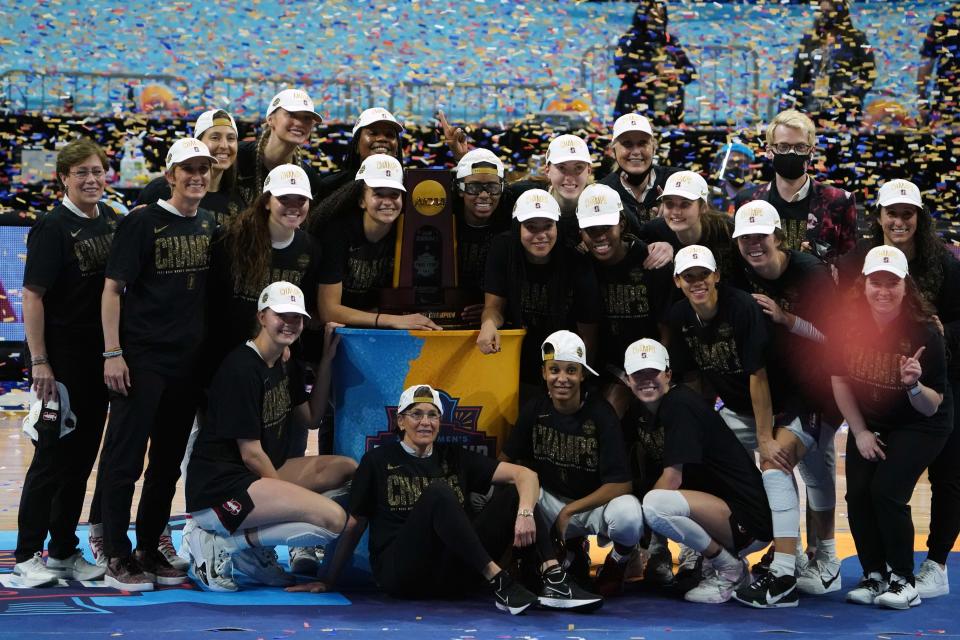Opinion: After NCAA's NIL ruling, college sports will never be the same and that's a good thing
The sun has set on the old era of college sports. Beginning Thursday, the last gasps of an antiquated model will be replaced by a landscape defined by the open marketplace for student-athletes to capitalize on their name, image and likeness.
The world of college sports will never be the same.
And it'll be a brave new world, full of opportunity and promise for the athletes who for generations have supplied the product with none of the profit. Even as the steady flow of revenue via television contracts, apparel deals and ticket sales remains in the hands of colleges and conferences, the granting of basic NIL rights represents a pivotal change to the long-standing definition of amateur athletics: that student-athletes may not capitalize financially on their achievements at the risk of being excommunicated from the NCAA.
That governing body fought back on this issue for years, and even when change was inevitable continued to table the discussion until Wednesday, when an interim policy enacted by the Division I Board of Directors granted a blanket waiver for all athletes to pursue endorsement deals and service contracts without fear of violating NCAA rules.
True to form, the NCAA's longstanding inaction and last-minute response reinforces the perception of an ineffectual organization behind the times and off the mark on the deciding topic of the day.
The NCAA's stance on NIL was always rendered toothless by a rare movement with wholesale support: Americans favor compensation for college athletes by more than a 2-to-1 margin, according to polling conducted by Seton Hall University, while state-by-state legislation has bridged the divide to stand as one of the few issues with bipartisan support during this moment of widespread political gridlock.
The floodgates are now open for athletes in all sports, men and women, with early evidence indicating the avenues these athletes can take to monetize their popularity.
Wisconsin quarterback Graham Mertz shared his personal logo and individual branding. Alabama cornerback Kool-Aid McKinstry has partnered with a company to sell personalized digital collectibles known as non-fungible tokens. Iowa guard Jordan Bohannon unveiled a line of merchandise and announced a partnership with a local fireworks company.
All athletes in Nebraska have been offered an endorsement deal by local restaurant chain Runza, which said Wednesday it would pay a single flat fee to the first 100 current athletes who promote the chain's rewards program.
MORE: Read about student-athletes who have made plans to cash in

Fresno State women's basketball players Haley and Hanna Cavinder, twins with millions of followers on TikTok, illustrate the potential earning power for athletes in non-mainstream sports and erase the theory that the biggest names in the biggest sports will capture the most lucrative or far-reaching endorsement contracts.
With a flood of endorsements expected Thursday, the biggest question outstanding doesn't ask whether these economic freedoms will have an impact, which is already obvious, but in what direction that impact will take college sports.
NIL rights have the potential to level the playing field and increase competitiveness in sports such as football, where the potential to cash in on endorsement deals could sway top-ranked recruits away from the established powers to programs where playing time and publicity are more easily attainable.
The opportunity to monetize this period may entice the nation's best basketball prospects to choose college — or another year of college — over the NBA's G League or recent startups Overtime Elite and the Professional Collegiate League, which have offered six-figure compensation to bypass the amateur experience.
For a five-star talent with NBA aspirations, couldn't one year in a major conference with the possibility to sign endorsement deals provide equal or greater benefit from a current and future financial perspective than spending the same time in one of these developmental leagues?
Many coaches in the major sports have expressed concern over the impact NIL will have on recruiting, which might trigger a slight exodus among members of the coaching community too entrenched in their ways to adapt. This old guard will be easily replaced by coaches willing to embrace NIL access in exchange for eight-figure contracts and golden-parachute buyout packages.
There is the potential issue of how endorsement contracts will play inside locker rooms, and whether deals would breed envy among teammates. Without a national clearinghouse to oversee all contracts, the opportunity exists for outside parties to work outside the lines established by state legislation — though cheating has been rampant for too long in college sports to really raise a red flag over NIL.
And there's this: The larger theme that has guided the NCAA for more than a century is suddenly replaced by something antithetical to our understanding of amateur athletics.
But the landscape has evolved. College sports has adapted. NIL now defines the landscape, creating the sort of change unseen since the advent of Title IX legislation nearly 50 years ago. Welcome to the new world of amateurism.
Follow USA TODAY Sports columnist Paul Myerberg on Twitter @PaulMyerberg
This article originally appeared on USA TODAY: College sports will never be the same and that's a good thing

